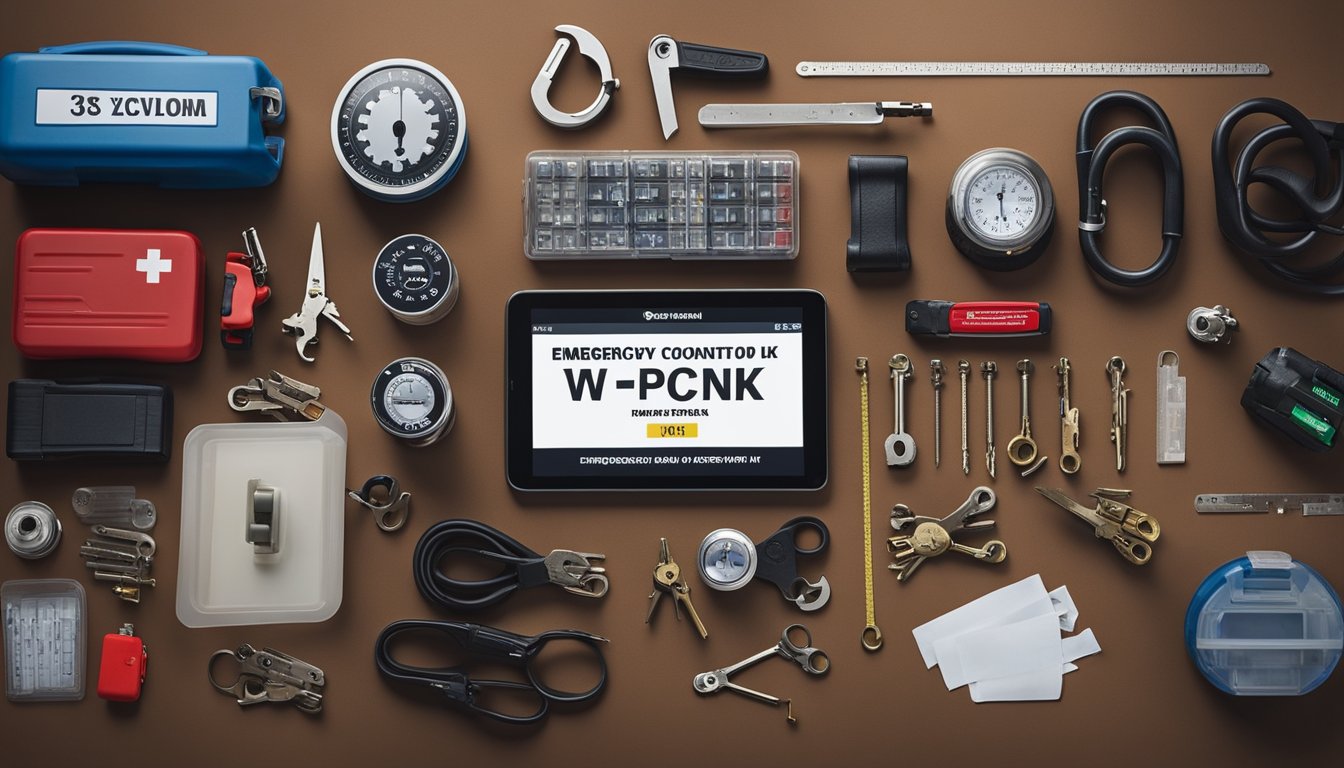Late updated: 21 Jul 2024 15:07
Written by: Elena Prescott
Best Practices for Locksmith Emergency Preparedness: Essential Tips for Immediate Response
Locksmiths play a pivotal role in emergency preparedness, often going beyond their traditional duties. With natural disasters and unexpected emergencies becoming increasingly prevalent, having a strategic plan in place is crucial. Locksmiths are indispensable in securing properties, ensuring safe access, and fortifying critical infrastructures during emergencies.

Effective emergency preparedness requires a comprehensive approach that integrates practical skills with a deep understanding of risk management. By collaborating with community emergency services, locksmiths can ensure that they remain operational and prepared for any crisis. Their unique skill set enables them to respond swiftly, minimising potential damage and enhancing community resilience.
Providing not only lockdown services but also structural reinforcements, locksmiths must stay abreast of best practices to protect both lives and property. Through continuous training and community collaboration, locksmiths can ensure that they are always ready to handle any emergency scenario, contributing significantly to overall safety and security.
Key Takeaways
- Locksmiths are vital for securing properties during emergencies
- Collaboration with emergency services enhances readiness
- Continuous training ensures effective emergency response
Foundations of Emergency Preparedness for Locksmiths

Locksmiths play a crucial role in ensuring security during emergencies by preparing, responding, and recovering from various disaster scenarios. This section delves into understanding risks, developing a response plan, and the importance of training.
Understanding Risks and Hazards
Identifying potential threats is the cornerstone of effective emergency preparedness. We need to conduct thorough risk assessments to evaluate both natural disasters like earthquakes and floods, and man-made disasters such as terrorism or accidental fires.
Understanding that each type of emergency presents unique challenges is critical. For example, natural disasters may disrupt access and communication, while man-made events might focus more on tampering or forced entry. By pinpointing these vulnerabilities, we can better mitigate risks.
Developing an Emergency Response Plan
Creating a comprehensive emergency response plan is essential for ensuring prompt and effective action during crises. This plan should outline clear communication protocols and response procedures for various scenarios.
Key elements include defining roles and responsibilities, establishing channels for quick information dissemination, and creating backup plans for essential services. Plan implementation requires collaboration with emergency management agencies to ensure that our strategies align with broader community efforts.
Preparation and Training
Training is pivotal for effective incident management. Regular training sessions, drills, and emergency management programs help us stay adept at handling emergency situations. These should cover everything from locksmith techniques under duress to communication strategies and incident management during different types of disasters.
To maintain a high level of readiness, participation in continuous training programmes and drills keeps us well-prepared. Ensuring we have the right tools and skills is necessary for a rapid and efficient response. This combined effort in preparation and training strengthens our capacity to secure buildings and support communities in times of need.
Operational Readiness and Community Collaboration

Operational readiness and collaboration with community stakeholders are essential for locksmiths to effectively respond in emergencies. This includes understanding roles in protecting communities and engaging with emergency management agencies for coordinated efforts.
Roles in Protecting Communities
Locksmiths play a pivotal role in safeguarding communities. Their expertise lies in ensuring that physical security measures are robust and impenetrable. During natural disasters or emergencies, locksmiths can assist in securing critical infrastructure and preventing unauthorized access, which is paramount for maintaining public safety.
We also provide essential services to businesses, ensuring that emergency exits and locks comply with safety regulations. This compliance mitigates risks during emergency evacuations. Locksmiths must stay updated with local and national security standards to effectively respond to evolving threats and improve community resilience.
Engaging with Emergency Management Agencies
Engaging with emergency management agencies such as FEMA is crucial for efficient emergency response and recovery. We must establish clear communication channels with these agencies to ensure timely and coordinated actions during emergencies. This cooperation facilitates quicker recovery and minimises the impact on businesses and communities.
Active collaboration with FEMA and other local emergency management groups ensures that we, as locksmiths, are integrated into broader emergency plans. This includes participating in regular drills and training sessions to stay prepared for various scenarios. By doing so, we enhance our operational readiness and better support the community's protection efforts.
Frequently Asked Questions
We often encounter a variety of questions about best practices for locksmith emergency preparedness. Here, we address some common concerns to provide clear and effective guidance.
How can one ensure quick access to locksmith services in an urgent situation?
Ensure you have the contact information of reliable locksmiths stored in your phone and written down in an accessible place. Many locksmiths offer 24/7 services, so choose one with round-the-clock availability.
It's also helpful to establish relationships with local locksmiths, so they recognise you when calls for help are made.
What are the essential tools a locksmith should have for emergency response?
A locksmith should carry a range of tools tailored for different lock types and scenarios. Crank tools, lock pick sets, tension wrenches, and key extractors are critical. Additionally, modern locksmiths should have electronic tools like key programmers and smart lock management devices.
Keeping these tools in a well-organised kit allows for faster response and efficiency during emergencies.
What strategies can be implemented to maintain security during a lockout emergency?
During a lockout, it's vital to verify the identity of the individual requesting entry to ensure they are authorised. Implementing quick yet thorough verification processes can prevent unauthorised access.
For high-security environments, using temporary security measures like portable locks or security personnel until the primary lock is rectified can be effective.
How can a locksmith safely manage emergency calls out of hours?
Safety protocols are essential for out-of-hours calls. Locksmiths should communicate job details and locations with a designated contact before attending a call.
Additionally, using tools like GPS trackers and personal alarms can offer an added layer of safety. Being cautious and aware of surroundings is also paramount during these hours.
What training should a locksmith undergo to handle emergencies efficiently?
A locksmith should complete courses in advanced lock mechanisms, emergency security solutions, and customer service skills. Continuous professional development and hands-on experience in real-world scenarios can enhance efficiency in handling emergency situations.
Staying updated with the latest technology and techniques ensures that locksmiths provide the best possible service.
How should a locksmith company structure its rapid response team for maximum effectiveness?
A rapid response team should be well-coordinated and include experienced locksmiths who are well-versed in various lock systems.
Utilising a robust communication system to dispatch locksmiths quickly and using GPS-enabled vehicles can reduce response times. Regular training sessions and drills can improve overall readiness and effectiveness.
